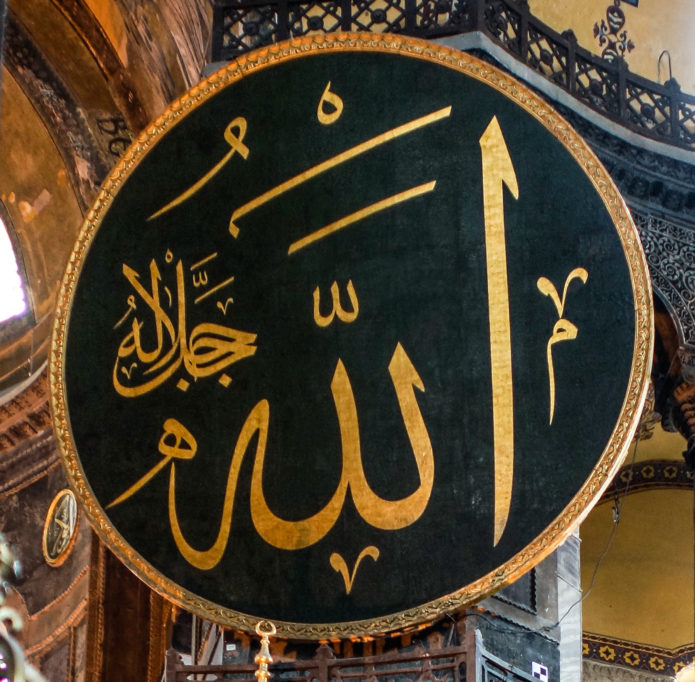Question:
Who is Allah?
I understand that he is the God of Muslims and the religion of Islam, but can you please give a short introduction, while explaining the meaning of the word ‘Allah’?
Answer:
Who is Allah?
‘Allah’ is the Arabic term for the One and only Creator of the universe. It is NOT a name for a tribal Arabian God or the God of Muslims. Thus, both Muslim and Christian Arabs refer to God as ‘Allah’ although their concept of God may differ.
Etymology of the word ‘Allah’
Allah ( اللَّه ) is driven from the root ‘Aleha’ (أَلِهَ) to mean ‘worshiped’. Thus, any deity – whether false or true, objects or humans – is called in Arabic ‘Elah’, whereas ‘Allah’ is a distinguished name to refer to the real Creator. The testimony of faith in Islam is expressed in Arabic as )لا إِلهَ إِلَّا اللَّه( ‘La Elaha ellAllah’ (there is no deity worthy of worship but Allah).
It is important to note that as Muslims we do not worship the name of ‘Allah’. Thus, you may refer to the reality of the One and only Creator using any good name: “To Allah belong all the most beautiful names, so call on Him by them.” (The Holy Qur’an 7:180)
However, we believe the term ‘Allah’ expresses the monotheistic concept of the Creator more accurately than the English ‘God’. Literally speaking, unlike ‘god’ there is no plurality for ‘Allah’. Similarly, the term ‘Allah’ is gender free.
Divine Beautiful Names
Although the Divine Names and Attributes are countless, the Almighty God has manifested Himself in the Qur’an with more than 200 divine names, of which 99 Names are known as ‘The Most Beautiful Names’. According to some traditions there is also a divine name that the Almighty Allah has kept to Himself often known as ‘The Greatest Name’. Each divine name introduces one of the attributes of the nature of God. For example, one of the divine names is ‘the Most Gracious’, which means His Grace is universally inclusive and infinite.
Thus Allah introduces Himself
The Almighty Allah has introduced Himself to His holy Prophet (s) in various revelations. The following are only some examples of divine names and attributes as revealed to the Prophet of Islam (s):
1. “Say (O Muhammad), He is Allah, the Unique, the Self-Sufficient to whom eventually all take their needs. He begets not, nor was He begotten. And there is none co-equal or comparable unto Him.” (the Holy Qur’an, 112)
2. “He is Allah, the Creator, the Inventor of all things, the Bestower of forms. To Him belong the Best Names. All that is in the heavens and the earth glorify Him. And He is the All-Mighty, the All-Wise.” (Ibid, 59:24)
3. “And when My devotees ask you (O Muhammad) concerning Me, then (answer them), I am indeed Near, I respond to the invocations of the supplicants when they call on Me. So let them obey Me and believe in Me, so that they may be led aright.” (Ibid, 2:186)
4. Allah! (is He Who) there is no (existing) deity but Him, the Ever Living Ever Protecting (all that exists), (Who) no any slumber and (let alone) any kind of sleep overtakes Him. To Him belongs whatever is in the heavens and whatever is on the earth. Who is he that can intercede with Him except with His Permission? He knows what happens to them (i.e. who intercede, or His creatures) in this world and what will happen to them in the Hereafter. They (who intercede, or His creatures) will never compass anything of His information except that which He wills. His sovereignty and knowledge extends all over the heavens and the earth, and He feels no fatigue in preserving them. He is the Most High, The Most Great.” (Ibid, 2:255)
5. “Proclaim (O Muhammad): O My Slaves who wronged themselves (by committing evil deeds and sins)! Despair not of the Mercy of Allah; verily, Allah forgives all sins. Truly He is Oft-Forgiving, Most Merciful.” (Ibid, 39:53)
Answered by: Sheikh Mansour Leghaei
For more Q&As on Allah (swt) please see here
Subscribe to our mailing list!



